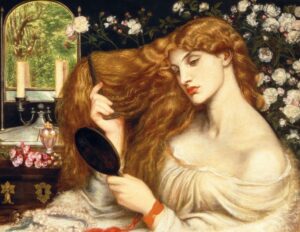
Opera Profile: Deborah Drattell’s ‘Lilith’
By John Vandevert“Lilith” is the first opera by American composer and designer Deborah Drattell. It was composed during the 1980s and premiered in 2001 in New York City with contemporary theatre director Anne Bogart at the helm.
It is based upon the biblical and mythological figure Lilith, the woman God created before Eve whose liberated stance and refusal to submit to Adam saw her expelled from the Garden of Eden and doomed to become a demon.
The Story
The plot of Drattell’s opera diverges from traditional, Christian theological accounts of Lilith and Eve, wherein the former is the scorned first woman while Eve is the submissive second who ultimately becomes the mother of the world. Rather, the opera depicts the funeral of Adam in the Garden of Eden. Eve is attendance but sees Lilith has also come. Eve confronts Lilith after discovering her despite her disguise. Ancient texts like the 7th century Alphabet of Sirach make reference to this occurrence, so Drattell’s operatic story is not so far-fetched.
After their initial confrontation the two women converse and come to understand one-another’s experiences and fates. The realization and acceptance of one’s life becomes the opera’s main theme. The opera teaches us to not only accept but embrace one’s circumstances.
Performance History
Work on the opera began in the late 1980s with Drattell’s 11-minute symphonic “tone poem” on the theme of Lilith. This work was performed with the New York Philharmonic in 1990 and soon after she expanded upon her fascination with the figure. At the time, she was a composer-in-residence at the Denver Symphony, and soon after the work premiered, the opera began to form. Ultimately, librettist David Steven Cohen was tasked with creating the libretto. The work had many well-known singers attached to it at the time of its planned premiere in 1997 with Dicapo Opera (1981-2013). This had to be suspended due to labor disputes at the time, however.
This didn’t stop Drattell from having her opera see the light of day. After some editing, the opera was performed in a concertized version at the 1998 Glimmerglass Festival. Due to its successful reception, the work had a new premiere lined up. In 2001, Drattell’s first opera would be performed with New York City Opera, with the esteemed American mezzo-soprano Beth Clayton as Lilith, accompanied by internationally celebrated American soprano Lauren Flanigan as Eve. Filling out the rest of the six-person principle cast were Tom Nelis as the Seer/Serpent who acts as the opera’s narrator, Marcus DeLoach as Eve’s son, and Dana Beth Miller as Eve’s daughter. Alongside the soloists are a nine-person group of mimes and a full chorus.
A full performance of the opera’s staged version at UC Sand Diego was recorded in 2015, with the plot of the opera having changed considerably since its 2001 premiere. In this updated version, Lilith finds Eve in a modern American restaurant and asks Eve if Adam can be loaned for the day. This gets Eve to thinking that Adam is being deceitful behind her back. Flash to God’s “Garden of Eden”and a divorce is taking place between Adam and Lilith. Here, Lilith is made out to be the villain due her adultery and kidnapping of young boys. In the end, in order to stop Lilith Eve must become a bit like Lilith.
In the performance, Bonnie Lander took on the role of Lilith or Claire, Eve (Eppy) was sung by Hillary Jean, and Philip Larson took on the role of “The Voice.” Adam, Arnold, was sung by Alvin Almazan. In this updated version, the Seer/Serpent is replaced with a narrative character called “The Voice,” while Eve’s son and daughter are cut.
Categories
Opera Wiki

